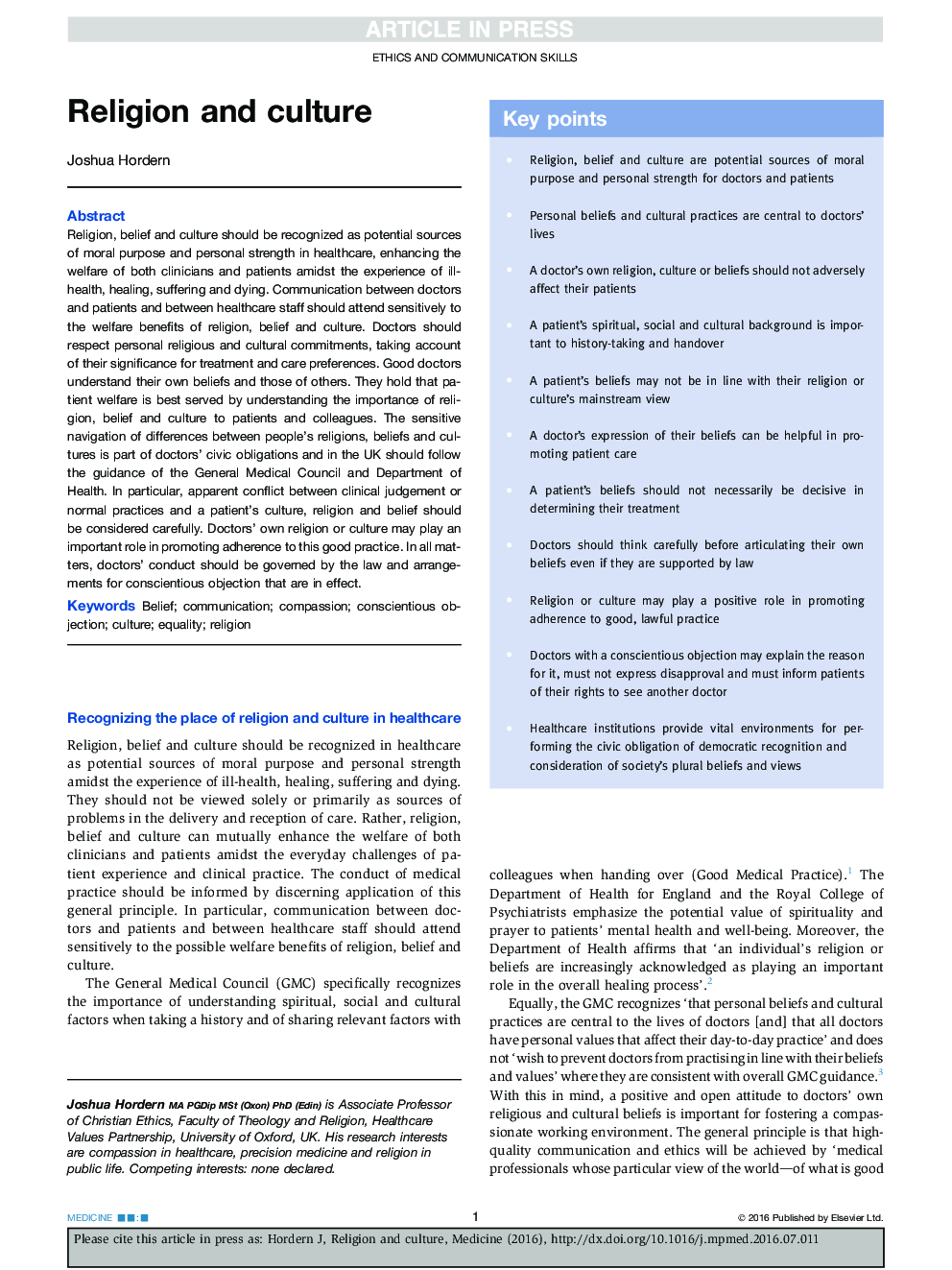| کد مقاله | کد نشریه | سال انتشار | مقاله انگلیسی | نسخه تمام متن |
|---|---|---|---|---|
| 5681216 | 1408814 | 2016 | 4 صفحه PDF | دانلود رایگان |
عنوان انگلیسی مقاله ISI
Religion and culture
ترجمه فارسی عنوان
دین و فرهنگ
دانلود مقاله + سفارش ترجمه
دانلود مقاله ISI انگلیسی
رایگان برای ایرانیان
کلمات کلیدی
اعتقاد، ارتباطات، رحم و شفقت - دلسوزی، اعتراض وجدان، فرهنگ، برابری، مذهب،
ترجمه چکیده
دین، اعتقاد و فرهنگ باید به عنوان منابع بالقوه اهداف اخلاقی و قدرت شخصی در مراقبت های بهداشتی، و افزایش رفاه پزشکان و بیماران در میان بیماری های سالم، شفا، رنج و مرگ، شناخته شود. ارتباط بین پزشکان و بیماران و میان کارکنان مراقبت های بهداشتی باید حساس به مزایای رفاهی دین، اعتقاد و فرهنگ باشد. پزشکان باید از تعهدات مذهبی و فرهنگی شخصی برخوردار باشند، با توجه به اهمیت آنها برای ترجیحات درمان و مراقبت. پزشکان خوب اعتقادات خود و دیگران را درک می کنند. آنها معتقدند که رفاه بیمار بهتر است با شناخت اهمیت مذهب، اعتقاد و فرهنگ به بیماران و همکارانش مورد استفاده قرار گیرد. ناوبری حساس اختلاف بین ادیان، باورها و فرهنگ های مردم بخشی از تعهدات مدنی پزشکان است و در انگلستان باید از راهنمایی شورای عمومی پزشکی و وزارت بهداشت حمایت کند. به طور خاص، درگیری دائمی بین قضاوت بالینی یا شیوه های طبیعی و فرهنگ، مذهب و باور بیمار باید با دقت مورد توجه قرار گیرد. دین یا فرهنگ شخصی پزشکان ممکن است نقش مهمی در ارتقاء پیروی از این عمل خوب داشته باشد. در تمام موارد، رفتار پزشکان باید توسط قانون و تدابیری برای اعتراض وجدان که در حال اجرا است، اداره شود.
موضوعات مرتبط
علوم پزشکی و سلامت
پزشکی و دندانپزشکی
پزشکی و دندانپزشکی (عمومی)
چکیده انگلیسی
Religion, belief and culture should be recognized as potential sources of moral purpose and personal strength in healthcare, enhancing the welfare of both clinicians and patients amidst the experience of ill-health, healing, suffering and dying. Communication between doctors and patients and between healthcare staff should attend sensitively to the welfare benefits of religion, belief and culture. Doctors should respect personal religious and cultural commitments, taking account of their significance for treatment and care preferences. Good doctors understand their own beliefs and those of others. They hold that patient welfare is best served by understanding the importance of religion, belief and culture to patients and colleagues. The sensitive navigation of differences between people's religions, beliefs and cultures is part of doctors' civic obligations and in the UK should follow the guidance of the General Medical Council and Department of Health. In particular, apparent conflict between clinical judgement or normal practices and a patient's culture, religion and belief should be considered carefully. Doctors' own religion or culture may play an important role in promoting adherence to this good practice. In all matters, doctors' conduct should be governed by the law and arrangements for conscientious objection that are in effect.
ناشر
Database: Elsevier - ScienceDirect (ساینس دایرکت)
Journal: Medicine - Volume 44, Issue 10, October 2016, Pages 589-592
Journal: Medicine - Volume 44, Issue 10, October 2016, Pages 589-592
نویسندگان
Joshua Hordern,
